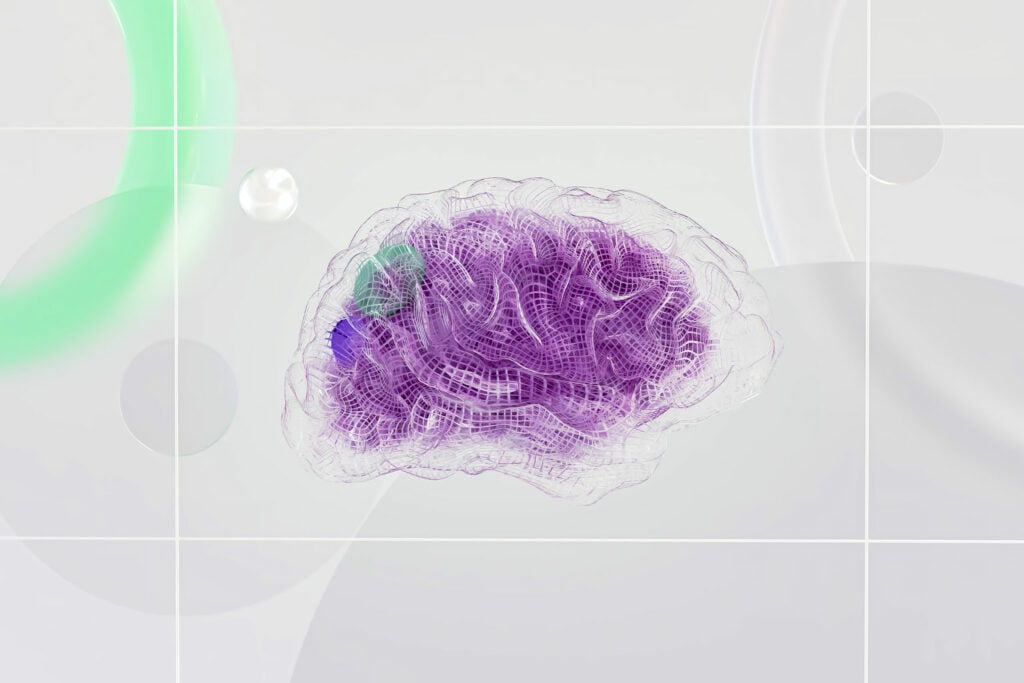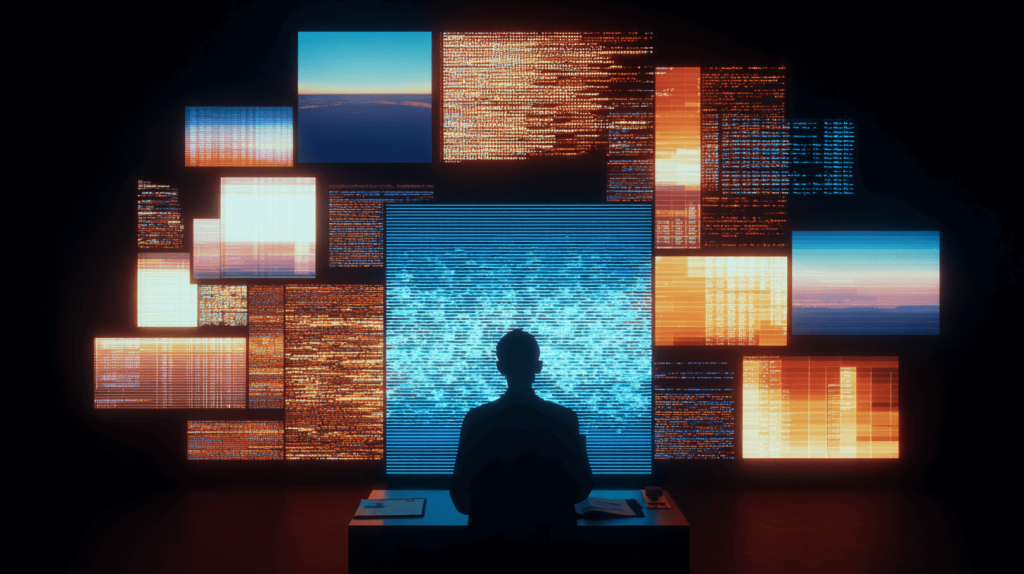Can AI be an inventor? As everyone around the world gets excited about the new age of artificial intelligence (AI), innovation around AI has exploded. According to IBM, 39% of businesses have already adopted AI into at least one aspect of their business, and 59% say AI will be critical to their future workplace.
The global AI software market is expected to reach $126 billion by 2025 and the number of organizations adopting AI over the last few years has increased by 270%. By 2025, an estimated 95% of customer interactions will be powered by some aspects of AI, offering businesses that invest in AI technology a competitive advantage when it comes to intellectual property, productivity, streamlined operations, and an improved customer experience.
Artificial intelligence advancements are truly the dawn of a new era. Now that AI has fully been unleashed, the world will never be the same — from the projection that 300 million jobs over the next few years will be displaced, thanks to AI, to the positive effects of improved healthcare, enhanced global supply chain security technology, and to investment in real business applications.
As AI innovation scales, companies will continue to protect their proprietary AI technology with patents and other intellectual property (IP) measures. While the listing of inventorship is a mandatory requirement on a patent application filing, the question of can AI be an inventor has been recently contemplated.
Can AI Be An Inventor?
Inventorship is one of the fundamental concepts in patent law and properly identifying all inventors is one of the under-emphasized aspects when applying to the United States Patent and Trademark Office (USPTO). Currently, patent requirements state that inventorship is not a discretionary issue and all inventors must be identified in the application. Generally, inventors are individuals who have made contributions to any of the subject matter featured in the claims of an application and not merely the conception of an idea.
Inventorship also requires the reduction of the idea or making a working example of the claimed invention. So, can AI be considered as the legal inventor on a patent application if it contributes to the subject matter of the claims? Currently, the answer to this question is “no,” and the listing of all human inventors and their duty of disclosure is fundamental to the validity of established patent rights.
One of the controversial aspects of the most recent AI revolution is the lack of regulation around the limits of AI technology. State and federal governments have yet to provide comprehensive legislation regarding the privacy and security aspects of this new technology and oversight regarding the speed with which AI platforms are being implemented. In order to keep the AI race from becoming reckless, there needs to be an establishment and development of rules, oversight, and enforcement of legal guardrails to deal with the velocity of AI evolution.
For example, Elon Musk, Steve Wozniak, and other prominent technology leaders have called for a six-month pause on AI inventions until AI governance and oversight could be crafted. The bottom line is the regulatory statutes and laws in place today are insufficient to handle the everchanging velocity of AI development leading to fearmongering and anxiety about the uncertainties of AI technology.
The Dawn of a New Era: AI and Intellectual Property
Copyright laws can be traced back to the intellectual property clause found in Article I Section 8 of the U.S. Constitution which states that Congress shall have the power to “promote the Progress of Science and useful Arts, by securing for limited times to authors and inventors the exclusive right to the writing and discoveries.” When defining the author or owners of copyright, 17 U.S. Code § 201 provides that copyright protection “vests initially in the author or authors of the work.” However, with the advancements in Open AI’s ChatGPT which can write and refine lyrics, structure song melodies, and develop novel plots AI brings all those legal considerations for IP into question.
Machine learning (ML), for example, is a subset of AI and other technologies that allow the machine to learn from data sets. ML seeks to automate discovery from data as the system actively learns from data sets or links an input to an output to make predictions on new data. ML allows user input into the systems that can analyze the outcomes of real data to generate its outcome.
Once many inputs are received, and feedback is given, the machine learning system becomes smarter and more accurate. Inevitably, this will lead to a machine learning or AI system that invents something of its own. In anticipation of these events, IP lawmakers and experts worldwide are considering who will be the original author or inventor of the work. Will the AI system be labeled as the inventor, or will the intellectual property rights lie with the original creator of the AI system?
Can AI Be Patented? Navigating the Legal Labyrinth of AI Intellectual Property
Yes! While the current USPTO filing requirements state that humans must be named inventors for purposes of patentability, this requirement hasn’t stopped the recent boom in AI technology-related patent application filings at patent offices around the world. From 2002 to 2018, AI patent application filings at the USPTO have increased by more than 100% to more than 60,000 annually. However, to successfully patent your AI platform, your patent application must demonstrate your AI technology in a specific software process based on a dataset input, model training and evaluation, and a desired prediction or outcome based on your trained AI model.
Can an AI Algorithm Be Patented?
One key area of popular AI invention is algorithms. Algorithms are a process or a set of rules or instructions created to solve a specific problem. An AI algorithm is the specific software programming that instructs the computer how to operate on its own.
If your business is developing a proprietary algorithm, your novel process or method to perform the algorithm may be a patentable subject matter if properly claimed in your patent application. Speak with an RLG AI software attorney to help identify and refine your AI process and pinpoint your points of novelty.
Who Is the Godfather of AI? Tracing the Genesis of AI
While it’s incredibly exciting to look to the future of AI, it’s equally fascinating to look at the origins of AI technology. Arguably, the modern-day godfather of AI is Geoffrey Hinton, but AI’s roots go as far back as the 1950s. Well-known British mathematician Alan Turing also wrote “Computing Machinery and Intelligence” in 1950 which proposed a test of machine intelligence called “The Imitation Game.”
Only two years later, a computer scientist named Arthur Samuel developed an AI program to play checkers. In 1997, International Business Machine (IBM) released Deep Blue, an AI program that used “pre-programmed expert knowledge” to defeat the world chess champion, Garry Kasparov. In 2023, the animated series South Park used ChatGPT to co-write an episode for their 26th season.
Nowadays it feels like everyone is talking about AI, but some are more vocal about the dangers and lack of regulation. Hinton, the godfather of AI, recently left his career at Google as a chatbot engineer to warn about the potential dangers of AI outperforming humans.
AI Patent Example: AI Patents That Are Shaping the Future
No longer just a thing of the future, AI patents are shaping everyday reality right now. AI patents are booming, and the United States Patent and Trademark Office is full of fascinating inventions being used every day across many different industries. Globally, the Chinese technology giant, Tencent, holds the most AI patents, while IBM, Microsoft, and Apple lead the United States.
The Metaverse
Made famous in web3 discussions, the metaverse is a combination of AI, deep learning, and augmented reality. One notable patent protecting meta is U.S. patent number 10,437,563 [Application Number 15/861,253]. While you might not be buying a house in the metaverse just yet, innovation around augmented reality and web3 will inevitably have its moment, just like AI.
Apple’s Face ID and Siri
An AI patent you likely use every day is Apple’s Face ID for unlocking iPhones and other Apple devices. In January 2021, Apple was granted a patent for Occlusion Detection for Facial Recognition Processes (US20190080149A1), using occlusion heatmap technology for facial recognition.
Another Apple AI invention that you might frequently encounter is the voice assistant, Siri. In 2018, Apple was granted U.S. Patent No. 10,043,516 for an intelligent automated assistant that uses natural language speech technology that is more popularly known as Siri.
Personalized Amazon Recommendations
Have you ever felt like Amazon recommendations anticipate your needs better than you can? In 2020, Amazon Technologies, Inc. was granted U.S. Patent No. 10,706,450 for the machine learning model that predicts buying intent based on user searches and provides recommendations and customized content and products based on users’ search data.
Artificial Intelligence Copyright: Who Owns The ©
While we’ve mainly discussed patent law, copyrights are another type of IP protection available for software and AI products. Copyright is a type of intellectual property law and often protects creative works like a software program’s code, art, music, books, poetry, architecture, and more. When pursuing protection for your AI invention, you might prefer to go the copyright route instead of patenting. Copyrights protect original works of authorship, including works such as algorithms, machine learning systems, computer vision systems, and more.
However, now that AI tools like DALL-E2 are generating their creative art and images, it raises the question, “Can copyrights protect AI-generated content?” Again, the current rulings state that human authorship is required in copyrightable works, so AI-generated art is not protectable. The core of this decision lies in the fact that AI-generated art creates a unique piece based on millions of other data points. Programs like DALL-E2 look for patterns and create a new image based on millions, if not billions, of other images. As a result, the AI system itself cannot be considered the original author, but lines get incredibly blurry when AI and humans create collaborative works.
The Road Ahead for AI and Intellectual Property
The road ahead for generative AI and copyright law is fascinating, complex, and, hopefully, bright. AI will become more sophisticated, most likely independently creating new and novel inventions. As new consumer-friendly tools emerge, everyday people might find themselves running into legal ramifications of AI usage.
AI patent filings will continue to increase as businesses around the world seek to create industry-relevant products that rely on AI and machine learning to streamline productivity, increase efficiency, and reduce costs.
Another consideration for determining authorship of work created through human and AI collaboration. For example, artist Kristina Kashtanova had the U.S. Copyright Office (USCO) backtrack on registering her partially AI-generated work. The USCO questioned her about the amount of human involvement while creating the novel in question and required her to document the creative process.
The USCO held that “anyone filing works that contain any portions generated by artificial intelligence must disclose such portions and be prepared to support their registration and prove a degree of human authorship.” The USCO further emphasized that a human author with ultimate creative control is necessary for copyright protection and that providing an AI with word prompts is insufficient to qualify.
When Patenting AI Inventions, Work with an Experienced Patent Attorney
Artificial intelligence patents are invaluable assets that will bring your company strategic value. Patents will not only protect your proprietary AI platform from infringement, increase the valuation of your company, and provide a competitive advantage in the marketplace, but will provide both short-term and long-term monetization strategies.
The Rapacke Law Group is a fixed fee (no billable hour) patent and intellectual property firm designed for software and technology companies looking to protect their most valuable intellectual property assets. Our firm provides one transparent fixed fee for all patent and trademark matters without the hassle of surprise costs or nickel-and-dime billing used by traditional law firms.
The RLG Guarantee
In addition to a fixed-fee billing approach, RLG offers a money-back guarantee on all prior art searches, trademark applications, provisional patent applications, and design patent applications. To be clear: should our team determine that your invention is not patentable in light of the prior art, a full refund will be provided. If patentable, we will credit the cost of your search towards your new application. For trademark and design patent applications, this means that if your application does not receive a notice of allowance for any reason, we will provide a full refund.
Our trademark and design patent application packages include all search, preparation, office action, USPTO correspondence, and filing fees. Please call us at (954) 951-0154 for a free consultation or take our intelligent IP quiz to see what protection is best for your invention.




